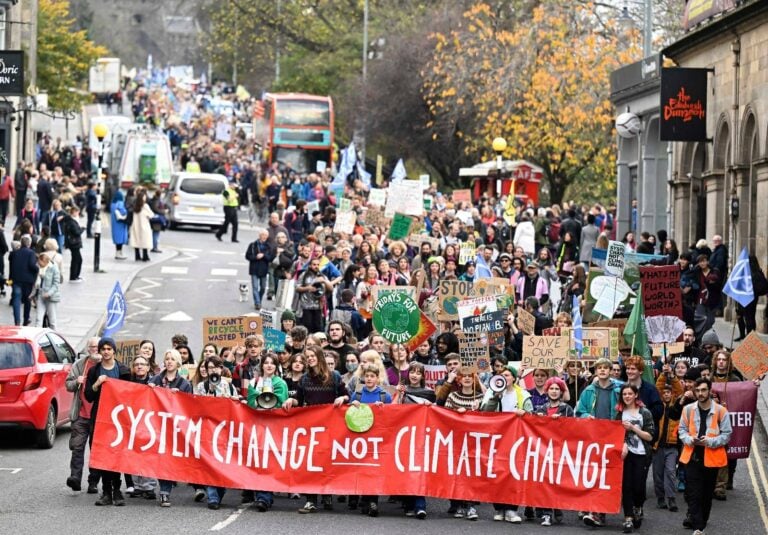
A new topic at the G20: ‘Green finance’
After China, which holds the Presidency of the G20, has introduced a ‘Green Finance Study Group’ (GFSG), the issues on the agenda have already been reduced. The GFSG has focused on environmental issues, so that finance and investment are oriented on greener economic activities.
This has led to the EU Ministers of Finance discussing the issue of “sustainable finance” for the first time, although the follow-up has not been transparent. At the same time, the financial sector is getting involved since it sees green finance as a new profit-making opportunity. It is also taking the lead in an initiative to disclose how much of its financing and assets are climate-related and at risk due to climate change.
In December 2015, the G20 Presidency was taken over by China, which introduced a “Green Finance Study Group” (GFSG), even though some other G20 members were opposed to such an issue group (US) or sceptical of it (Germany). As this is not a G20 “working” group, the GFSG cannot make G20 recommendations, but the results will be presented to the Minsters of Finance at their meeting in July 2016, with a request to continue – or not.
The study group started discussing different issues in working groups on how to mobilise private capital for:
- Greening the banking system
- Improving and scaling up the green bonds market
- Greening institutional investment
- Leveraging private green investment through public finance
- Environmental risk management and stress testing
- Developing ways for measuring the progress of green financial activities.
The official mandate is to identify market failures and institutional barriers to progress in these areas, taking stock of existing innovations and best practices as well as their impacts, along with whether harmonisation or advice is needed from the G20. No regulations are to be looked into. The above-mentioned issues (4) and (5) seem to have been abandoned by the Ministers of Finance at their April 2016 meeting (see point 10 in their Communiqué(opens in new window) in which a study group results outline has already been agreed upon for the upcoming synthesis report.
UNEP Inquiry holds the secretariat of the study group and has published extensively on green finance(opens in new window) . The Chinese G20 Presidency has separated the green finance agenda from the climate finance working group and G20 work on inclusive finance, as well as from the financial architecture issues agenda.
Some have been sceptical about the motives of the Chinese G20 Presidency, and questioned whether this represents a “greenwashing” or is merely following the current post-climate summit mood. It is likely, however, that China is interested in the “green finance” issue, as pollution from industrialisation has become a real problem in China, and could lead to social unrest and thus challenges to the regime. In order to keep the focus on financing greener economic initiatives, China did not want to combine the Green Finance Study Group with the Climate Finance Working Group, which would focus on financing from official sources and the Green Climate Fund. Nor did China seek solutions for a “sustainable” finance that combines environmental, social and long-term systemic issues.
The financial sector already sees green finance as an opportunity for new profit-making activities and financial centres are competing to take the lead. Immediately after a GFSG meeting, the B20 – the business lobby around the G20 – organised a 23 March conference on green finance in “The City”(opens in new window) of London, where hardly any critical voices were heard. The Governor of the Bank of England, Mark Carney, made a surprise short speech at the B20 conference, promoting the issue as one that could develop new instruments and products on which traditional profitable financial instruments (financial markets, bonds, hedging, etc.) could be based.
Sustainable finance discussed by ECOFIN
For the first time, the EU Ministers of Finance discussed an agenda point called “sustainable finance” at their informal ECOFIN meeting in Amsterdam on 22-23 April 2016. The Dutch Central Bank prepared and presented a paper “Financing the transition to a sustainable economy”(opens in new window) with several discussion points. The goal of ECOFIN discussions was to put sustainable finance on the EU agenda in a broader way, thereby linking it with international initiatives (e.g. the G20, FSB) and the role of supervisors. The Netherlands feels that private financial institutions can make an important, positive contribution to sustainable development, but that incentives are needed and harmonisation of standards may have to be developed. The Capital Markets Union agenda (CMU) should include greening investment. Note that the European Commission’s Directorate-General for Financial Stability, Financial Services and Capital Markets Union (DG FISMA) is responsible for providing the EU’s input to the G20 Green Finance Study Group. However, DG FISMA’s knowledge and interest in incorporating aspects of sustainability into financial regulation has been very limited so far. It is unclear what DG FISMA’s input has been within the G20 GFSG, and its submission to the informal ECOFIN was principally limited to its known position to improve green bonds as part of the CMU agenda. The EC’s strategic unit(opens in new window) is developing a paper on sustainable finance. The European Central Bank (ECB) is also involved, and together with the European Systemic Risk Board, is developing an environmental stress test for integration into the financial sector’s risk management to expose the financial risks of climate change. The purpose is to avoid overlap between different initiatives. It is not clear how much attention will be on incorporating social aspects in the EU’s discussions and initiatives on “sustainable finance”, e.g. improved access to finances for the poor and systemic issues. So far, neither DG FISMA nor the Dutch Presidency has engaged with civil society.
Task Force on Climate-related Financial Disclosures
In 2015, the Governor of the Central Bank of England and Chairman of the Financial Stability Board (FSB), Mark Carney, highlighted the dangers of climate change for the financial sector. He warned that the financial sector will be affected by climate change (e.g. storms can destroy real estate investments, stranded assets can result in losses for financial investors). Such devalued assets can lead to financial instability(opens in new window) , which is relevant to finance ministers, central bankers and supervisors.
As a result, an industry-led “FSB Task Force on Climate-related Financial Disclosures(opens in new window) ” has been set up (and can be followed on Twitter @FSB_TCFD). The business participants finished their first phase of work with a report for public consultation(opens in new window) whose deadline for submissions was extended from 1 May to 31 May 2016. The task force started to develop more details in its second phase of work. The voluntary guidelines are expected to be ready by the end of 2016(opens in new window) and the EU has indicated to be ready to take Task Force results into account.
Do you need more information?
-

Myriam Vander Stichele
Senior Researcher
Related news
-
 The Netherlands: European champion share buybackPosted in category:Long read
The Netherlands: European champion share buybackPosted in category:Long read Rodrigo FernandezPublished on:
Rodrigo FernandezPublished on: -
 The trillion-dollar threat of climate change profiteersPosted in category:Long read
The trillion-dollar threat of climate change profiteersPosted in category:Long read Myriam Vander StichelePublished on:
Myriam Vander StichelePublished on: -
The treaty trap: The miners Published on:
 Vincent KiezebrinkPosted in category:Publication
Vincent KiezebrinkPosted in category:Publication Vincent Kiezebrink
Vincent Kiezebrink

